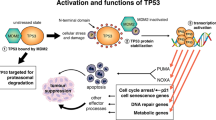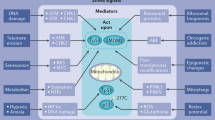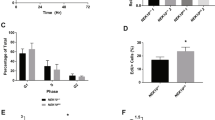Abstract
The tumour-suppressor gene p53 is frequently mutated in human cancers and is important in the cellular response to DNA damage1,2. Although the p53 family members p63 and p73 are structurally related to p53, they have not been directly linked to tumour suppression, although they have been implicated in apoptosis3,4,5,6,7,8,9. Given the similarity between this family of genes and the ability of p63 and p73 to transactivate p53 target genes10,11, we explore here their role in DNA damage-induced apoptosis. Mouse embryo fibroblasts deficient for one or a combination of p53 family members were sensitized to undergo apoptosis through the expression of the adenovirus E1A oncogene12,13,14. While using the E1A system facilitated our ability to perform biochemical analyses, we also examined the functions of p63 and p73 using an in vivo system in which apoptosis has been shown to be dependent on p53. Using both systems, we show here that the combined loss of p63 and p73 results in the failure of cells containing functional p53 to undergo apoptosis in response to DNA damage.
This is a preview of subscription content, access via your institution
Access options
Subscribe to this journal
Receive 51 print issues and online access
$199.00 per year
only $3.90 per issue
Buy this article
- Purchase on Springer Link
- Instant access to full article PDF
Prices may be subject to local taxes which are calculated during checkout




Similar content being viewed by others
Change history
26 May 2023
Editor’s Note: Readers are alerted that the reliability of data presented in this manuscript is currently in question. Appropriate editorial action will be taken once this matter is resolved.
28 February 2024
An Editorial Expression of Concern to this paper has been published: https://doi.org/10.1038/s41586-024-07223-4
References
Levine, A. J. p53, the cellular gatekeeper for growth and division. Cell 88, 323–331 (1997).
Evan, G. I. & Vousden, K. H. Proliferation, cell cycle and apoptosis in cancer. Nature 411, 342–348 (2001).
Yang, A. et al. p63, a p53 homolog at 3q27–29, encodes multiple products with transactivating, death-inducing, and dominant-negative activities. Mol. Cell 2, 305–316 (1998).
Irwin, M. S. & Kaelin, W. G. Jr Role of the newer p53 family proteins in malignancy. Apoptosis 6, 17–29 (2001).
Stiewe, T. & Putzer, B. M. Role of the p53-homologue p73 in E2F1-induced apoptosis. Nature Genet. 26, 464–469 (2000).
Agami, R., Blandino, G., Oren, M. & Shaul, Y. Interaction of c-Abl and p73α and their collaboration to induce apoptosis. Nature 399, 809–813 (1999).
Gong, J. G. et al. The tyrosine kinase c-Abl regulates p73 in apoptotic response to cisplatin-induced DNA damage. Nature 399, 806–809 (1999).
Jost, C. A., Marin, M. C. & Kaelin, W. G. Jr p73 is a simian [correction of human] p53-related protein that can induce apoptosis. Nature 389, 191–194 (1997).
Yuan, Z. M. et al. p73 is regulated by tyrosine kinase c-Abl in the apoptotic response to DNA damage. Nature 399, 814–817 (1999).
Di Como, C. J., Gaiddon, C. & Prives, C. p73 function is inhibited by tumor-derived p53 mutants in mammalian cells. Mol. Cell. Biol. 19, 1438–1449 (1999).
Gaiddon, C., Lokshin, M., Ahn, J., Zhang, T. & Prives, C. A subset of tumor-derived mutant forms of p53 down-regulate p63 and p73 through a direct interaction with the p53 core domain. Mol. Cell. Biol. 21, 1874–1887 (2001).
Lowe, S. W., Ruley, H. E., Jacks, T. & Housman, D. E. p53-dependent apoptosis modulates the cytotoxicity of anticancer agents. Cell 74, 957–967 (1993).
Lowe, S. W. & Ruley, H. E. Stabilization of the p53 tumor suppressor is induced by adenovirus 5 E1A and accompanies apoptosis. Genes Dev. 7, 535–545 (1993).
Lowe, S. W., Jacks, T., Housman, D. E. & Ruley, H. E. Abrogation of oncogene-associated apoptosis allows transformation of p53-deficient cells. Proc. Natl Acad. Sci. USA 91, 2026–2030 (1994).
Lee, Y., Chong, M. J. & McKinnon, P. J. Ataxia telangiectasia mutated-dependent apoptosis after genotoxic stress in the developing nervous system is determined by cellular differentiation status. J. Neurosci. 21, 6687–6693 (2001).
Herzog, K. H., Chong, M. J., Kapsetaki, M., Morgan, J. I. & McKinnon, P. J. Requirement for Atm in ionizing radiation-induced cell death in the developing central nervous system. Science 280, 1089–1091 (1998).
Chong, M. J. et al. Atm and Bax cooperate in ionizing radiation-induced apoptosis in the central nervous system. Proc. Natl Acad. Sci. USA 97, 889–894 (2000).
Zaika, A., Irwin, M., Sansome, C. & Moll, U. M. Oncogenes induce and activate endogenous p73 protein. J. Biol. Chem. 276, 11310–11316 (2001).
Miyashita, T. et al. Tumor suppressor p53 is a regulator of bcl-2 and bax gene expression in vitro and in vivo. Oncogene 9, 1799–1805 (1994).
Yin, C., Knudson, C. M., Korsmeyer, S. J. & Van Dyke, T. Bax suppresses tumorigenesis and stimulates apoptosis in vivo. Nature 385, 637–640 (1997).
Attardi, L. D. et al. PERP, an apoptosis-associated target of p53, is a novel member of the PMP-22/gas3 family. Genes Dev. 14, 704–718 (2000).
Oda, E. et al. Noxa, a BH3-only member of the Bcl-2 family and candidate mediator of p53-induced apoptosis. Science 288, 1053–1058 (2000).
Jacks, T. et al. Tumor spectrum analysis in p53-mutant mice. Curr. Biol. 4, 1–7 (1994).
Yang, A. et al. p63 is essential for regenerative proliferation in limb, craniofacial and epithelial development. Nature 398, 714–718 (1999).
Yang, A. et al. p73-deficient mice have neurological, pheromonal and inflammatory defects but lack spontaneous tumours. Nature 404, 99–103 (2000).
Kinsella, T. M. & Nolan, G. P. Episomal vectors rapidly and stably produce high-titer recombinant retrovirus. Hum. Gene Ther. 7, 1405–1413 (1996).
Wells, J., Boyd, K. E., Fry, C. J., Bartley, S. M. & Farnham, P. J. Target gene specificity of E2F and pocket protein family members in living cells. Mol. Cell. Biol. 20, 5797–5807 (2000).
Acknowledgements
We thank J. Sage for critical reading of the manuscript, W. G. Kaelin and M. S. Irwin for human TAp73α mammalian expression vector, L. Attardi for PERP cDNA, D. MacPherson for helpful discussions, and K. Olive for p53+/- mice. This work was supported in part by the NIH and Howard Hughes Medical Institute. E.R.F. is a postdoctoral fellow of the Leukemia and Lymphoma Society of America. K.Y.T. is supported by the Medical Scientist Training Program and a Koch graduate fellowship. T.J. is an Associate Investigator of the Howard Hughes Medical Institute.
Author information
Authors and Affiliations
Corresponding author
Ethics declarations
Competing interests
The authors declare that they have no competing financial interests
Rights and permissions
About this article
Cite this article
Flores, E., Tsai, K., Crowley, D. et al. p63 and p73 are required for p53-dependent apoptosis in response to DNA damage. Nature 416, 560–564 (2002). https://doi.org/10.1038/416560a
Received:
Accepted:
Published:
Issue Date:
DOI: https://doi.org/10.1038/416560a
This article is cited by
-
Gain-of-function p53R175H blocks apoptosis in a precursor model of ovarian high-grade serous carcinoma
Scientific Reports (2023)
-
p63: a crucial player in epithelial stemness regulation
Oncogene (2023)
-
DNA damage response revisited: the p53 family and its regulators provide endless cancer therapy opportunities
Experimental & Molecular Medicine (2022)
-
Requirement for TP73 and genetic alterations originating from its intragenic super-enhancer in adult T-cell leukemia
Leukemia (2022)
-
p63, a key regulator of Ago2, links to the microRNA-144 cluster
Cell Death & Disease (2022)
Comments
By submitting a comment you agree to abide by our Terms and Community Guidelines. If you find something abusive or that does not comply with our terms or guidelines please flag it as inappropriate.



